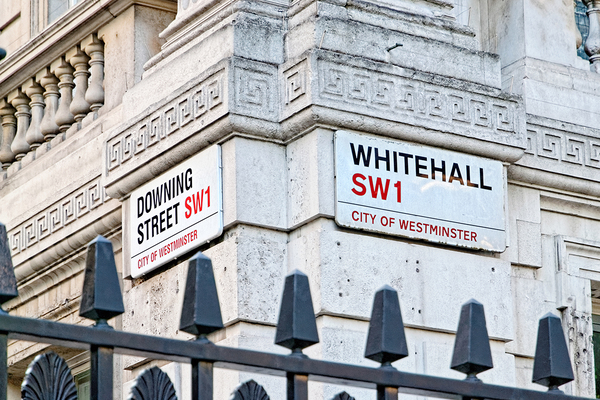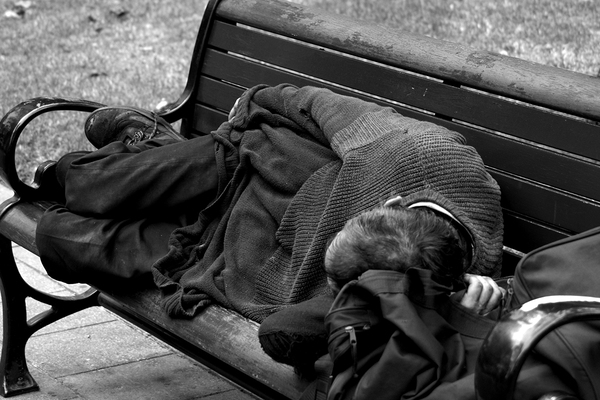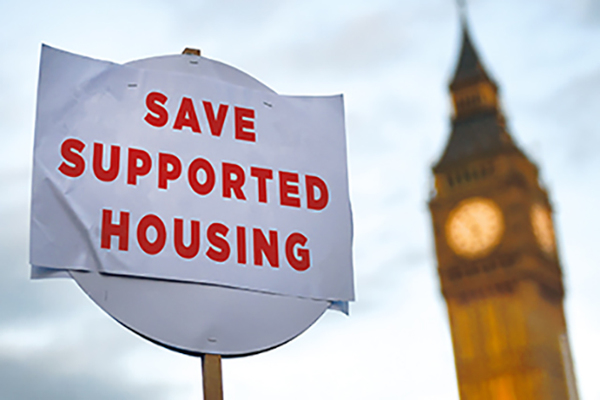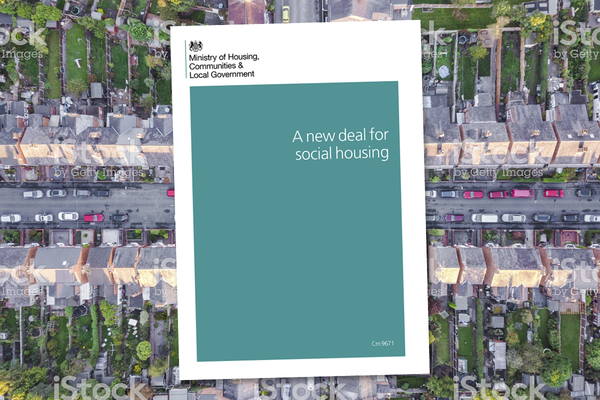You are viewing 1 of your 1 free articles
Supported housing and rough sleeping: reasons for positivity but much more to do
David Orr, Rick Henderson and Sian Hawkins assess recent government announcements on supported housing funding and rough sleeping
Over the past week we’ve seen two connected and significant announcements for homelessness in England from the government – a decision on supported housing funding and the Rough Sleeping Strategy.
Both have a lot to be welcomed, but will they make a real difference to the lives of people who have very particular, and often very urgent, housing needs? The answer to this question is both yes, and, on the other hand, no.
The decision to retain funding for housing costs for all supported housing in the benefit system is very welcome.
“When the supported housing funding announcement came earlier this month, the government showed it had listened, understood and was prepared to change its mind.”
The schemes most at risk from the previous funding proposal – a ringfenced grant to local authorities – were those designed for people who need immediate and often emergency accommodation.
Schemes intended for survivors of domestic abuse fleeing for their lives, homeless people, or people with drug and alcohol misuse needs were also at risk.
When the announcement came earlier this month, the government showed it had listened, understood and was prepared to change its mind.
In the short term this will provide the certainty needed to keep the doors of supported housing schemes open. It will also mean more schemes can be set up.
In the long term, as well as having the buildings and beds necessary in supported housing, we also need funding for the support that must go with it.
Since the removal of the Supporting People ringfence in 2009 (a grant used to pay for housing-related support services for vulnerable adults), more and more supported housing schemes have closed because they can no longer afford to provide support, or have got by scraping together funds however they can.
This is particularly apparent for domestic abuse refuges.
Our national network of refuges is not only a vital safety net for when survivors flee abuse, but is essential to survivors’ long-term recovery and breaking the cycle of homelessness.
Yet these life-saving services are currently operating on increasingly short-term, shoestring budgets, with one in 10 of all domestic abuse services currently not receiving any local authority funding for their support costs.
Demand for refuges continues to far outstrip supply, with 94 women and 90 children turned away from refuges on just one day last year.
So it was, we think, significant that the government said it would carry out a review of support funding too.
“Our national network of refuges is not only a vital safety net for when survivors flee abuse, but is essential to survivors’ long-term recovery and breaking the cycle of homelessness.”
It has committed to working with the sector to produce a robust national oversight for supported housing to help tackle the current postcode lottery of provision.
This sent out the powerful message that the government understands that supported housing does not work without funding for support too.
Protecting supported housing, which makes a significant contribution to helping people off the streets, seems a good place to start if you want to end rough sleeping by 2027 – the aim of the Rough Sleeping Strategy.
The plan was certainly full of good intent, with some of the urgency and commitment required to tackle a desperate situation getting worse by the day.
The reasons people end up sleeping rough and the solutions to helping them are complex – that is why we were pleased so many government departments and sector organisations were brought together to develop the strategy.
While we would have liked to see more of this cross-department working and a greater representation of people with lived experience involved, they did engage people who knew what they were doing and what would make a difference, and they listened.
“A systematic joined-up approach is starting to emerge from the government.”
It also contains some good practical measures, including rough sleeping navigators, and money for new initiatives and pilots, such as flexible support funding to help people at risk of rough sleeping and a Somewhere Safe to Stay pilot.
However, secure and affordable housing is simply in short supply in England. And despite last Tuesday’s green paper bringing an important focus to social housing in this country, with no promise of new money to build genuinely affordable homes it did little to address this worry. We need to build more homes for rough sleepers, for those at risk of becoming homeless, and to meet need across the country.
We also need a full and frank assessment of the impact of welfare reform on rough sleeping, something that is currently lacking in the strategy and is having an adverse and drastic impact on the lives of women and children especially.
These announcements show a systematic joined-up approach is starting to emerge from the government, but it still needs to be broadened to take into account welfare and supply.
The government must keep the dialogue open with our sector and across government departments to build a sustainable, holistic and impactful strategy. Only then can we start to build the homes the country desperately needs and guarantee everyone has a secure, safe place to stay to get on with their lives.
David Orr, chief executive, National Housing Federation; Rick Henderson, chief executive, Homeless Link and Sian Hawkins, head of campaigns and public affairs, Women’s Aid
Social Housing Green Paper: full coverage
All our Social Housing Green Paper coverage in one place:
Green paper measures are not enough to create May’s ‘new generation’ of council homes Green paper proposals are welcome but much more is needed to support councils to build, writes John Bibby
Green paper shows ministers now see associations as trusted partners Focusing on the failure of the green paper to address supply misses the point, writes Boris Worrall
Government should focus on building on what is already strong Philippa Jones considers the Social Housing Green Paper through a slightly different lens
We need more than a week of delayed announcements bundled together Jules Birch reflects on the government’s ‘Housing Week’ announcements
The regulator should monitor how associations assist homeless people Government announcements this week are positive, but any enhanced role for the English regulator should include looking at homelessness prevention work, argues David Bogle
The regulator’s role should be limited to dealing with systemic failures Julian Ashby suggests the Housing Ombudsman Service should deal with all complaints
The green paper shows ministers are in listening mode Despite some glaring omissions, the government appears to be in listening mode and it is important the sector takes advantage, argues Emma Maier
A short history of social housing league tables Attempts to create league tables for housing associations are nothing new. Mervyn Jones looks at how they have worked in the past
League tables could prove blunt and counter-productive, sector warns Housing figures criticise government proposals to measure social landlords against performance indicators
Government ‘must decide how proactive regulator should be’ on consumer standards Ministers now face a dilemma over the regulator’s focus, sector figures say
The Green Paper: a golden opportunity missed? Melanie Rees assesses the Social Housing Green Paper against recommendations drawn up by the Chartered Institute of Housing and finds the government comes up short
Longer strategic partnerships and guranteed debt to boost social housebuilding The Social Housing Green Paper outlines key ways of boosting supply
The green paper is remarkable progress but it is still not enough The green paper suggests the government appears to be re-writing much of its policy since 2010, but more needs to be done, writes Jules Birch
Green paper marks a ‘milestone’ on resident involvement The government’s recognition residents need clear information is to be welcomed, now it up to the sector to embrace tenant involvement, writes Paul Hackett
Ministers consider stock transfer programme to community-led associations The stock transfer programme could be revived under proposals in the housing green paper
Access to housing grant could be tied to new league tables Grant could be awarded according to how well landlords meet performance indicators, the paper suggests
Ofsted-style regulation of tenant services proposed The government is considering expanding the Regulator for Social Housing’s remit to intervene over tenant services and give it a more “proactive approach to enforcement”
Government proposes dropping one-for-one Right to Buy replacement commitment A consultation paper published alongside the green paper proposes a broader measurement to replace the one-for-one pledge
A list of recent housing policy U-turns The green paper confirms yet more housing policy U-turns from the government, which has spent the past two years dropping policy ideas developed under the David Cameron government. Here is a rundown of the major changes in policy direction
Sector welcomes green paper but calls for more ‘ambitious investment’ Reaction to the proposals, from the National Housing Federation, Chartered Institute of Housing and more
Morning Briefing: reaction to green paper announcements how the media reported the proposals trailed by the government overnight
Government drops plans to force councils to sell higher-value stock The government drops plans to force councils to sell higher value homes
League tables and ‘sharper teeth’ for regulator in social housing green paper Ministers reveal some of the things in the paper ahead of its publication
Grenfell survivors: green paper does not go far enough survivors of the Grenfell Tower fire have said the measures published in the Social Housing Green Paper do not do enough to rectify issues in the social housing sector












